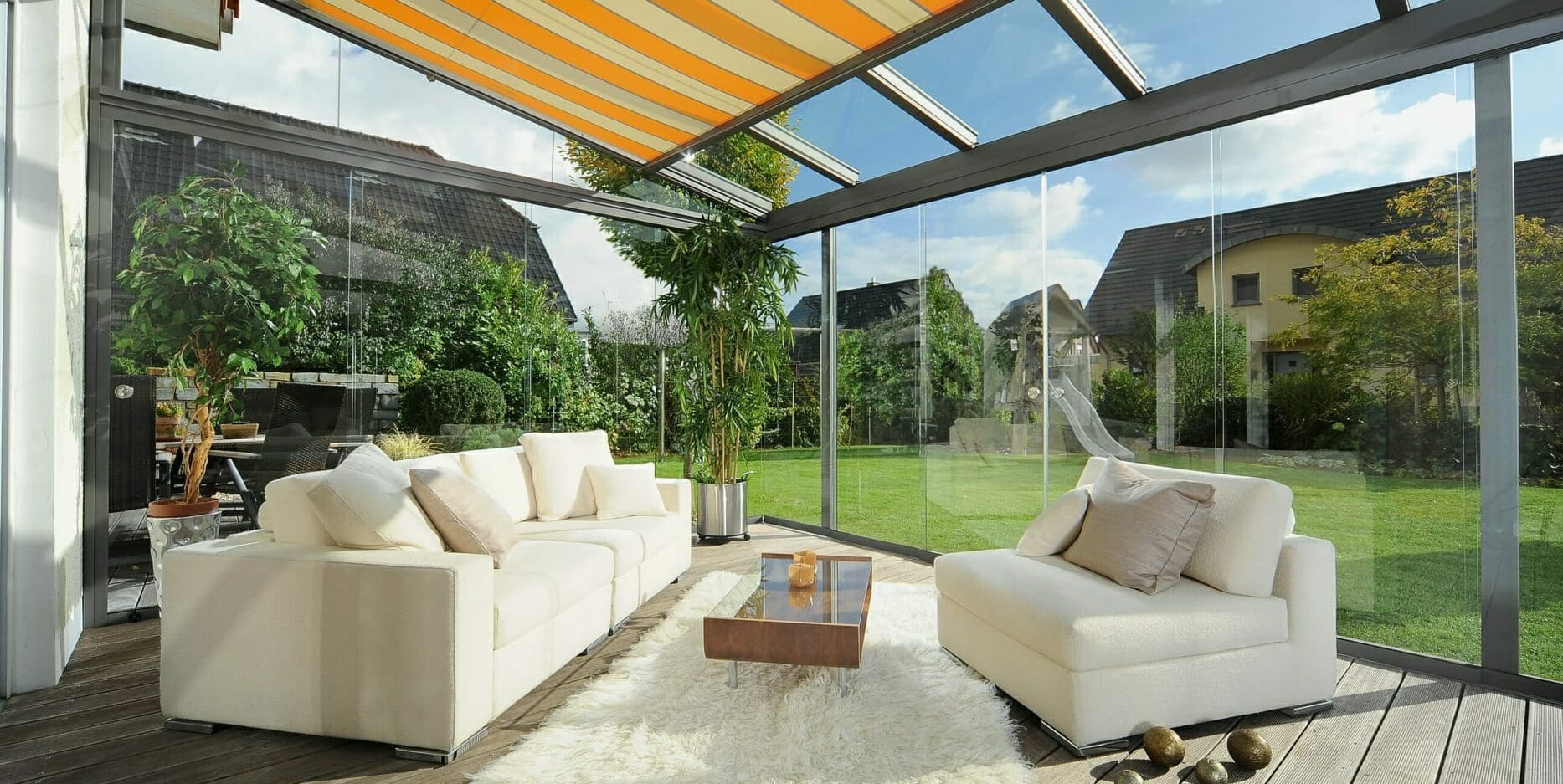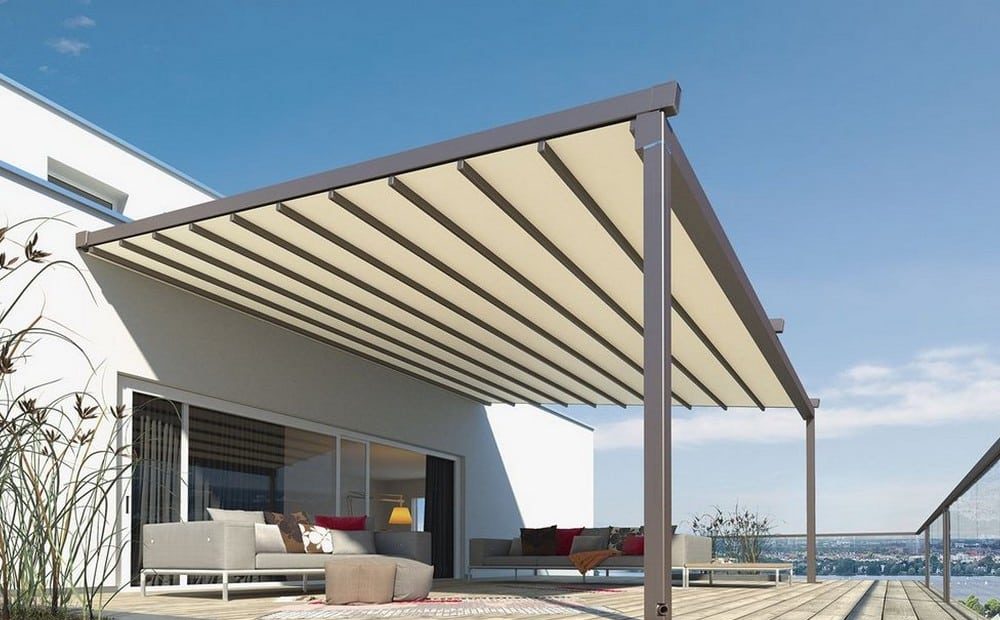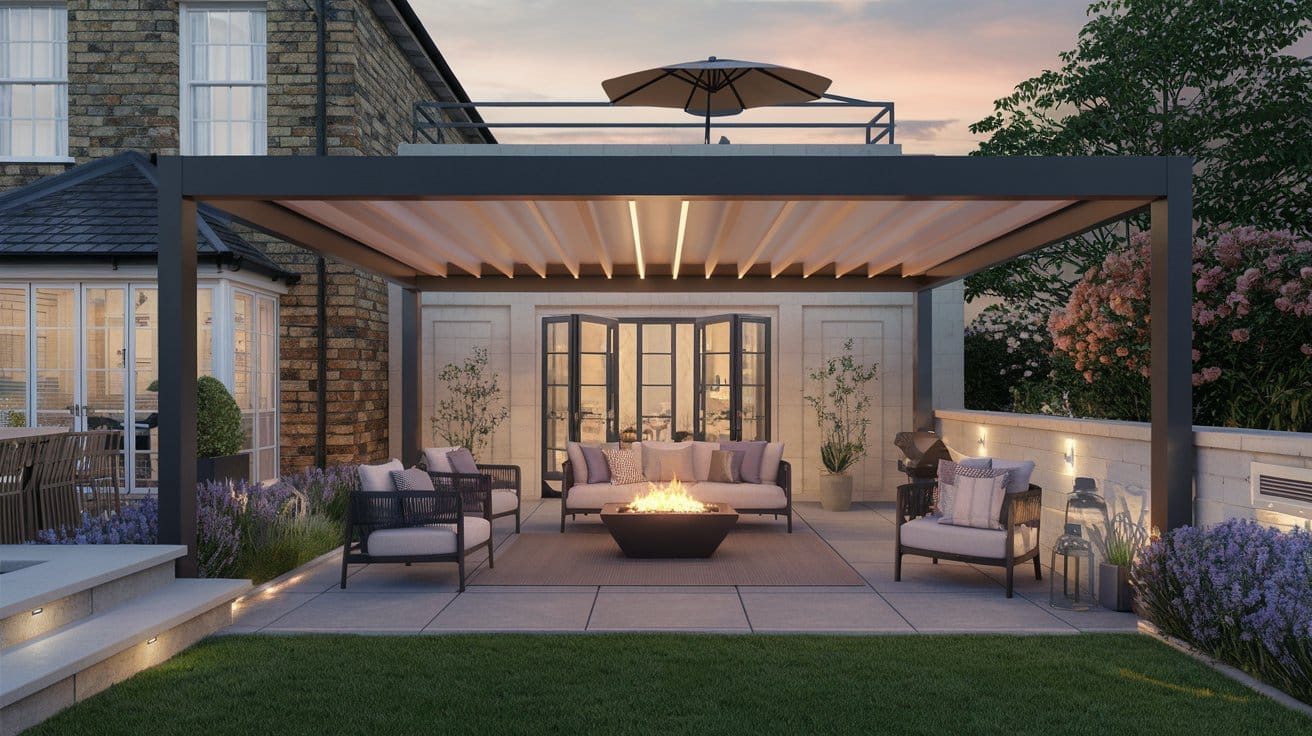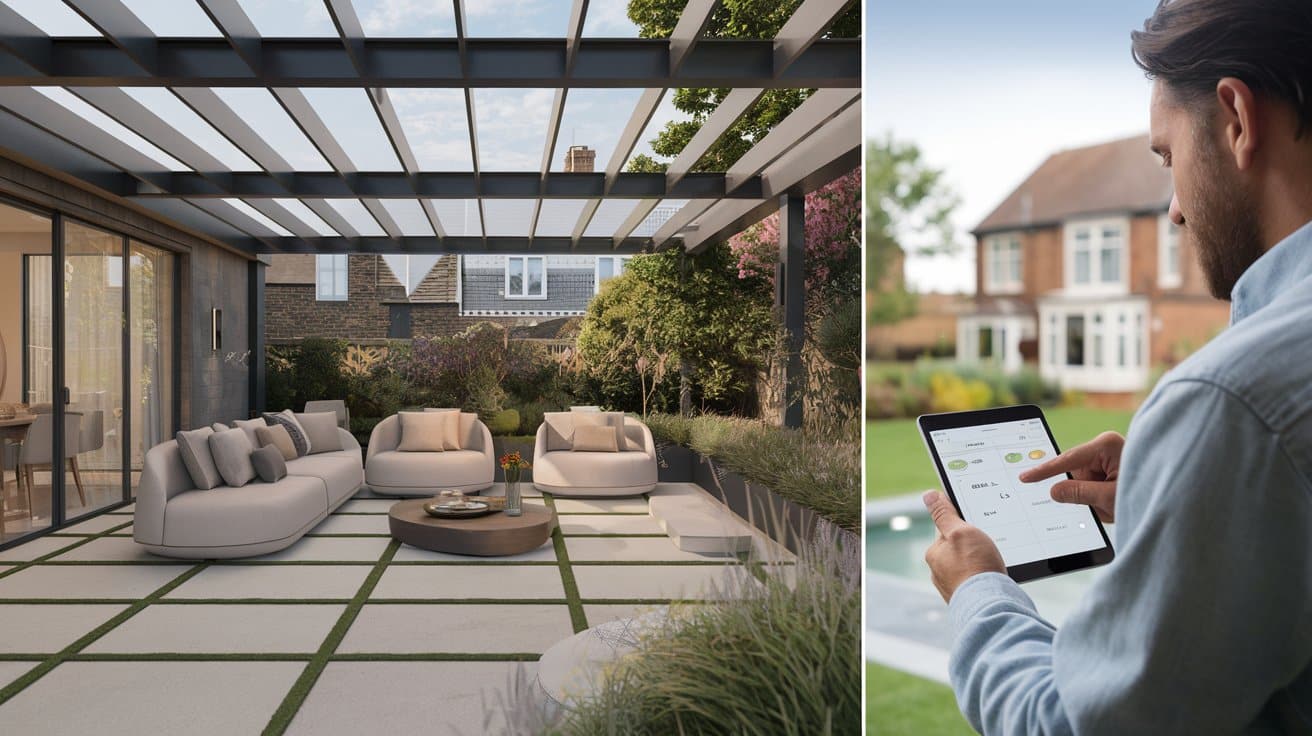Discover the Dynamics of the UK Awning Market
The UK awning market is transforming outdoor spaces into functional and aesthetic havens. With a growing emphasis on sustainability, awnings are essential in enhancing energy efficiency and reducing carbon footprints. Our Weinor products, renowned for their durability and eco-friendly features, lead this evolution.
The Role of Awnings in Outdoor Living
Awnings significantly enhance outdoor living by offering shade and protection while boosting aesthetic appeal. They provide:
- Energy Efficiency: Awnings reduce the need for artificial cooling, lowering energy consumption.
- Versatility: Ideal for creating comfortable outdoor areas for relaxation and entertainment.
- Aesthetic Enhancement: Available in various designs and colours, they complement any architectural style.
Current Market Size and Growth
The UK awning market is experiencing significant growth, driven by a surge in demand for eco-friendly solutions. This trend is fueled by:
- Technological Advancements: Integration of smart home features and sustainable materials.
- Consumer Preferences: Increasing interest in outdoor living spaces that offer both functionality and style.
Historical Context and Evolution
Awnings have evolved from simple sunshades to sophisticated structures that integrate seamlessly with modern architecture. Key developments include:
- Customization Options: Tailored solutions meet specific aesthetic and functional needs.
- Sustainability Focus: Use of eco-friendly materials and energy-efficient technologies.
Integral Role in the Outdoor Living Industry
Awnings are integral to the outdoor living industry, enhancing property value and lifestyle quality. They:
- Complement Other Solutions: Work alongside glass rooms and patios to create cohesive outdoor environments.
- Support Eco-Conscious Living: Align with sustainable practices, reducing environmental impact.
Explore our comprehensive report on the UK awning market to fully understand these dynamics. Our team at The Outdoor Living Group is ready to assist you in transforming your outdoor space with innovative, sustainable solutions.

What Are the Key Growth Drivers and Trends?
The UK awning market is witnessing a remarkable transformation as homeowners increasingly seek to extend their living spaces outdoors. This surge in demand is driven by the desire for multifunctional areas that seamlessly blend indoor comfort with outdoor enjoyment. Our Weinor products are at the forefront of this trend, offering customizable awnings and glass rooms that enhance both aesthetics and functionality.
Technological Innovations
Technological advancements are revolutionising the market. Smart home integration and energy-efficient materials are reshaping user experiences, allowing homeowners to effortlessly control their outdoor environments. Our products, equipped with app-controlled features and weather-resistant fabrics, integrate seamlessly with existing home systems, enhancing both control and efficiency.
Economic Influences
Economic factors significantly contribute to market growth. With increased disposable income and a focus on home improvement, consumers are prioritising long-term investments that enhance property value. Our eco-friendly solutions offer sustainability without compromising style or functionality. Additionally, government incentives for sustainable living further encourage the adoption of our products.
Sustainability and Consumer Preferences
As consumer preferences shift towards sustainability, technological innovations are increasingly tailored to meet these demands, driving further growth. Our commitment to integrating renewable energy sources in awning systems exemplifies this trend, offering both environmental and economic benefits.
Digital Influence
Digital platforms are reshaping consumer education and product selection, influencing purchasing decisions. As the market evolves, our focus remains on delivering sophisticated and versatile outdoor solutions that meet the evolving expectations of our clients.
How Do Consumer Preferences Shape the Market?
Consumer preferences are pivotal in shaping the UK awning market, driving trends in design, functionality, and sustainability. As homeowners increasingly seek to enhance their outdoor spaces, the demand for customizable and eco-friendly solutions has surged.
Trends in Awning Design and Functionality
- Modern Aesthetics: Consumers favour sleek, contemporary designs that seamlessly integrate with their homes, enhancing both visual appeal and property value.
- Multifunctionality: There’s a growing demand for awnings that offer more than just shade, such as integrated lighting and heating systems for year-round use.
Consumer Demand for Sustainable Solutions
- Eco-Friendly Materials: The use of sustainable materials, such as recycled fabrics and energy-efficient technologies, is becoming a priority for eco-conscious consumers.
- Solar Integration: Consumers are increasingly interested in solar-powered awnings that reduce energy consumption and align with environmental goals.
Impact of Consumer Behaviour on Market Dynamics
- Smart Home Integration: The desire for convenience drives the adoption of smart technologies, allowing consumers to control awnings via apps and voice commands.
- Customization Options: Consumers expect personalised solutions that cater to their specific needs, influencing manufacturers to offer a wider range of customization options.
Evolution of Consumer Preferences
Over time, consumer preferences have evolved to reflect a greater emphasis on sustainability and outdoor living. This shift has prompted manufacturers to innovate, offering products that not only meet functional needs but also align with environmental values.
What Are the Latest Technological Advancements?
In the realm of outdoor living, smart technology is transforming how we interact with our spaces. Our Weinor awnings now offer seamless integration with smart home systems, enabling effortless control of shading, lighting, and heating through voice commands or mobile apps. This innovation enhances convenience and optimises energy use, ensuring a comfortable and eco-friendly outdoor experience.
Smart Technology Integration
- Automated Weather Sensors: These sensors adjust awnings based on weather conditions, ensuring optimal comfort and energy efficiency.
- Remote Control and Apps: Manage your awnings from anywhere using your smartphone, providing flexibility and ease of use.
- Voice Command Compatibility: Integrate with smart home systems for hands-free operation, enhancing user experience.
Eco-Friendly Materials
Our commitment to sustainability is evident in our use of recycled fabrics and energy-efficient components. These materials not only reduce our carbon footprint but also ensure long-lasting durability, aligning with the values of eco-conscious consumers.
Impact on Consumer Choices
Technological advancements are reshaping consumer preferences, with a growing demand for smart, sustainable solutions. Our products meet these needs, offering innovation and environmental benefits that enhance the appeal of outdoor spaces.
Innovations in Awning Design
Modern awning designs incorporate sleek aesthetics and multifunctional features, such as solar panels and energy-efficient lighting. These innovations improve usability and allow for easy customization and expansion, making them ideal for any outdoor setting.
Economic Factors Influencing the Market
Economic forces play a crucial role in the UK awning market, influencing both consumer behaviour and industry trends. Understanding these dynamics is essential for navigating market complexities.
Inflation and Its Impact
Rising inflation affects material costs, leading to necessary price adjustments for awnings. As inflation increases, operational expenses rise, squeezing profit margins and potentially delaying consumer purchases. During periods of high inflation, demand for luxury outdoor solutions may decline as consumers prioritise essential spending.
- Price Adjustments: Inflation drives up material costs, resulting in higher product prices.
- Consumer Behaviour: High inflation can lead to delayed purchases as consumers focus on necessities.
Influence of Disposable Income
Disposable income significantly impacts consumer spending on awnings. When consumers enjoy higher disposable income, they are more inclined to invest in premium outdoor solutions, viewing them as lifestyle enhancements. Conversely, economic downturns that reduce disposable income lead to cautious spending, affecting demand for discretionary items like awnings.
- Investment in Premium Solutions: Higher disposable income encourages spending on luxury outdoor products.
- Cautious Spending: Economic downturns result in reduced spending on non-essential items.
Regulatory Environment and Industry Impact
Government regulations, including building codes and environmental standards, shape the awning industry by dictating product specifications. Compliance with these regulations can increase production costs but also enhance product credibility. Furthermore, government incentives for sustainable practices can boost consumer interest in eco-friendly awnings, aligning with broader environmental goals.
- Regulatory Compliance: Adhering to regulations can increase costs but improve market credibility.
- Sustainable Incentives: Government incentives encourage the adoption of eco-friendly solutions.
Broader Economic Influences
The broader economic landscape, including global trade dynamics and currency fluctuations, impacts the awning market. Economic stability encourages investment in home improvement projects, while uncertainty shifts consumer preferences towards energy-efficient solutions. Additionally, economic policies, such as interest rates, affect consumer financing options, influencing purchasing decisions.
- Global Trade Dynamics: Currency fluctuations and trade policies affect material costs and availability.
- Consumer Financing: Interest rates influence consumer decisions on financing outdoor projects.
Regional Market Analysis: Where Are the Key Regional Markets?
The UK awning market thrives on regional diversity, with urban centres like London and the South East leading the charge. Here, the demand for space-efficient, technologically advanced solutions is high, as consumers prioritise smart integrations that maximise limited outdoor spaces.
Regional Consumer Preferences
Urban dwellers often seek the convenience of smart home integrations, while rural consumers favour natural aesthetics and sustainable materials to blend with their surroundings. This divergence shapes product offerings and influences broader market trends.
Economic Impact on Market Dynamics
Economic factors, such as disposable income, play a crucial role in purchasing decisions. Affluent regions invest in premium solutions, driving innovation and market growth. Conversely, areas with economic constraints focus on cost-effective, durable options.
Cultural and Lifestyle Influences
Regional cultural nuances and lifestyle preferences dictate design and functionality needs. Unique architectural styles across the UK require tailored solutions, ensuring seamless integration with existing structures. This specificity fosters innovation as manufacturers adapt to diverse consumer needs.
What Are the Future Projections and Opportunities?
The UK awning market is set for substantial growth, driven by shifting consumer preferences and technological innovations. As urban areas expand, the need for space-efficient, multifunctional outdoor solutions is expected to increase. Government incentives for sustainable living further support this trend, encouraging the adoption of eco-friendly awnings.
Opportunities for Innovation and Expansion
- Renewable Energy Integration: Incorporating solar panels into awning systems offers significant potential for innovation, providing both environmental and economic advantages.
- Smart Home Advancements: As technology evolves, awnings with automated controls and energy-efficient features will attract tech-savvy consumers.
- Modular and Customizable Designs: Expanding product lines to include modular solutions that suit various architectural styles can capture a wider market segment.
Strategies for Embracing Emerging Trends
- Consumer-Centric Approach: Focusing on personalised solutions that address specific needs can enhance customer satisfaction and loyalty.
- Digital Engagement: Utilising digital platforms for consumer education and engagement can drive informed purchasing decisions and brand loyalty.
- Sustainable Partnerships: Collaborating with eco-friendly material suppliers ensures sustainable product offerings, aligning with consumer values.
Impact of Future Trends on the Market
Climate change and remote work trends are reshaping consumer preferences, increasing demand for weather-resistant, durable products. The growing interest in biophilic design, which integrates natural elements into outdoor living solutions, further influences market dynamics. Businesses that adapt and innovate will thrive in the evolving awning market.
Contact The Outdoor Living Group Today
Imagine your outdoor area as a personalised oasis, perfectly tailored to your needs and aesthetic preferences. At The Outdoor Living Group, we bring this vision to life with our bespoke awning installations, ensuring each project complements your property seamlessly.
Our Expertise in Outdoor Solutions
- Unmatched Experience: With over 20 years in the industry, our expertise in awnings and outdoor solutions is unparalleled.
- Innovative and Sustainable: We integrate cutting-edge technology and eco-friendly materials to create sustainable outdoor spaces.
Tailored Services for Your Needs
- Comprehensive Consultations: Our personalised consultations ensure every detail of your project is meticulously planned.
- Bespoke Design Solutions: We offer custom designs that enhance both functionality and aesthetics, tailored to your unique needs.
Why Choose Us?
- Expert Guidance: Our team provides personalised advice, helping you make informed decisions to optimise your awning installation.
- Seamless Indoor-Outdoor Living: Enjoy a harmonious blend of indoor and outdoor spaces, perfect for relaxation and entertainment.
Personalised Awning Advice
- Customised Recommendations: We offer tailored advice based on your specific requirements, ensuring your awning complements your property perfectly.
- Guidance Every Step of the Way: From initial consultation to final installation, our team ensures a stress-free experience.
Reach out to us today to discover how our expertise and personalised solutions can elevate your outdoor living space. Let us help you create a sustainable, stylish, and functional environment that enhances your lifestyle.
FAQs
Key Trends in the UK Awning Market
Consumer Preferences and Market Trends
Today's eco-conscious consumers prioritise sustainability and energy efficiency. This shift is evident in the rising popularity of solar-powered awnings and recycled fabrics. Customization is also a major trend, as individuals seek personalised solutions that reflect their unique aesthetic and functional needs.- Sustainability: The demand for eco-friendly products is on the rise, with consumers favouring materials that minimise environmental impact.
- Customization: Personalised awning designs are highly sought after, allowing consumers to tailor products to their specific preferences.
Technological Advancements
Smart technology is revolutionising the awning market, offering unparalleled convenience and functionality. Automated weather sensors and app-controlled features empower users to effortlessly manage their outdoor environments, enhancing both comfort and sustainability.- Smart Home Integration: Awnings equipped with smart controls offer seamless operation and improved energy efficiency.
- Automated Features: Weather sensors adjust awnings based on conditions, optimising comfort and reducing energy use.
Economic Influences
Economic factors significantly shape market dynamics. Increased disposable income and government incentives for sustainable living encourage investment in premium outdoor solutions. However, inflation and material costs can impact pricing and consumer purchasing decisions.- Disposable Income: Higher income levels drive demand for luxury awnings, seen as lifestyle enhancements.
- Government Incentives: Policies promoting sustainability boost interest in eco-friendly awning solutions.
How Do Consumer Preferences Affect the Awning Market?
Modern consumers increasingly demand sustainable, customizable awnings that enhance outdoor spaces while aligning with environmental values. This shift propels market innovation and growth.
Trends in Awning Design and Functionality
- Seamless Integration: Consumers favour awnings that blend with home architecture, enhancing visual appeal and functionality.
- Smart Features: The rise of app-controlled systems and automated weather sensors simplifies outdoor management.
- Robust Durability: Awnings must withstand diverse weather conditions, ensuring reliability and longevity.
Demand for Sustainable Solutions
- Eco-Conscious Materials: Preference grows for recycled fabrics and energy-efficient components, minimising environmental impact.
- Solar-Powered Options: Solar integration offers energy savings and supports sustainable living.
Market Dynamics Shaped by Consumer Behaviour
Consumer preferences drive innovation, compelling manufacturers to expand customization options. This demand fosters market growth and product diversity.
Evolving Consumer Expectations
As sustainability and functionality become priorities, consumer preferences evolve, reflecting broader cultural shifts. Technology plays a crucial role in shaping these expectations, positioning the awning market for continued innovation.
What Technological Advancements Are Influencing the Market?
Smart Technology Integration
- Responsive Adjustments: Sensors automatically adapt to weather changes, maximising comfort and efficiency.
- Remote Management: Control your outdoor environment from anywhere via smartphone, enhancing convenience.
- Hands-Free Operation: Integrate with smart home systems for effortless control, elevating user experience.
Commitment to Sustainability
Weinor prioritises eco-friendly materials, using recycled fabrics and energy-efficient components. These choices reduce environmental impact while ensuring durability, aligning with eco-conscious values.Consumer Influence
Technological advancements drive consumer demand for smart, sustainable solutions. Our products meet these needs, offering innovation and environmental benefits that enhance outdoor spaces.Design Innovations
Modern awnings feature sleek aesthetics and multifunctional elements like solar panels and energy-efficient lighting. These innovations improve usability and customization, ideal for any setting.How Do Economic Factors Impact the Awning Market?
Inflation's Influence on Market Dynamics
Inflation directly impacts the cost structure within the awning industry. As inflation rises, material costs increase, leading to higher prices for consumers. This can deter potential buyers, affecting sales volumes. To mitigate these effects, manufacturers often seek cost-effective materials, which can influence product quality and innovation.- Rising Costs: Inflation drives up operational expenses, squeezing profit margins.
- Consumer Hesitation: High inflation can delay purchases as consumers prioritise essential spending.
The Role of Disposable Income in Consumer Spending
Disposable income levels directly influence consumer spending on awnings. When disposable income is high, consumers are more likely to invest in premium outdoor solutions, viewing them as lifestyle enhancements. Conversely, during economic downturns, reduced disposable income leads to cautious spending, with consumers prioritising essential purchases over luxury items.- Investment in Premium Products: Higher disposable income encourages spending on luxury outdoor solutions.
- Cautious Spending: Economic downturns result in reduced spending on non-essential items.
Government Regulations and Industry Impact
Government regulations, including building codes and environmental standards, shape the awning industry by dictating product specifications. Compliance with these regulations can increase production costs but also enhance product credibility. Additionally, government incentives for sustainable practices encourage the development of eco-friendly products, aligning with consumer values and boosting market appeal.- Regulatory Compliance: Adhering to regulations can increase costs but improve market credibility.
- Sustainable Incentives: Government incentives encourage the adoption of eco-friendly solutions.
Broader Economic Influences
The broader economic environment, including global trade dynamics and currency fluctuations, impacts the awning market. Economic stability encourages investment in home improvement projects, while uncertainty shifts consumer preferences towards energy-efficient solutions. Additionally, economic policies, such as interest rates, affect consumer financing options, influencing purchasing decisions.- Global Trade Dynamics: Currency fluctuations and trade policies affect material costs and availability.
- Consumer Financing: Interest rates influence consumer decisions on financing outdoor projects.
Where Are the Key Regional Markets for Awnings?
Regional Consumer Preferences
- Urban vs. Rural: Urban areas seek convenience through smart integrations, while rural regions emphasise natural aesthetics and sustainability.
- Economic Influence: Wealthier regions invest in premium solutions, whereas economically constrained areas prefer cost-effective options.
Impact on Market Dynamics
Regional economic factors, including disposable income levels, significantly influence purchasing decisions. Affluent areas drive innovation and market growth by investing in premium solutions. Conversely, regions with economic constraints focus on durable, cost-effective options, shaping overall market dynamics.Influence of Regional Differences
Cultural and lifestyle nuances across regions dictate design preferences and functionality needs. Unique architectural styles require tailored solutions, ensuring seamless integration with existing structures. This regional specificity fosters innovation as manufacturers adapt to diverse consumer needs.What Are the Future Projections for the UK Awning Market?
Opportunities for Innovation and Expansion
- Solar Integration: Incorporating solar panels into awnings offers both environmental and economic benefits, reducing energy consumption and enhancing sustainability.
- Modular Designs: Expanding product lines to include modular, customizable options caters to diverse architectural styles, capturing a broader market segment.
- Smart Home Advancements: As technology evolves, awnings equipped with automated controls and energy-efficient features attract tech-savvy consumers.
Strategies for Embracing Emerging Trends
- Personalised Solutions: Focusing on tailored products that meet specific consumer needs enhances customer satisfaction and loyalty.
- Digital Engagement: Using digital platforms for consumer education and engagement drives informed purchasing decisions and brand loyalty.
- Sustainable Partnerships: Collaborating with eco-friendly suppliers ensures sustainable product offerings, aligning with consumer values.










